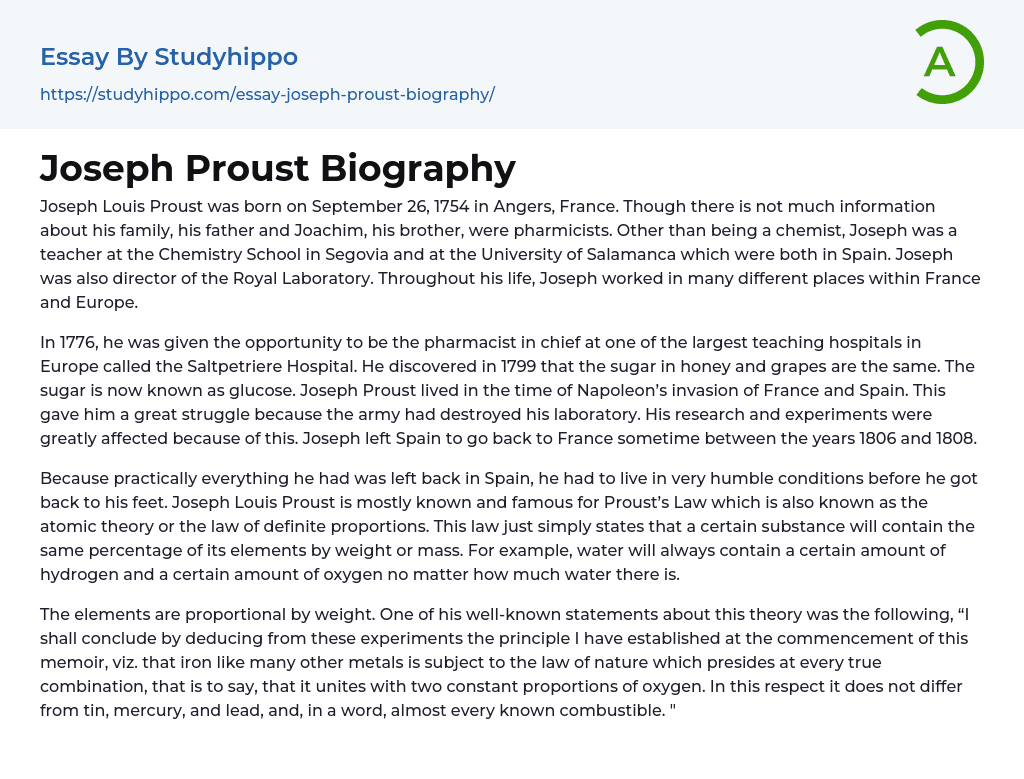Joseph Louis Proust was born on September 26, 1754 in Angers, France. Though there is not much information about his family, his father and Joachim, his brother, were pharmicists. Other than being a chemist, Joseph was a teacher at the Chemistry School in Segovia and at the University of Salamanca which were both in Spain. Joseph was also director of the Royal Laboratory. Throughout his life, Joseph worked in many different places within France and Europe.
In 1776, he was given the opportunity to be the pharmacist in chief at one of the largest teaching hospitals in Europe called the Saltpetriere Hospital. He discovered in 1799 that the sugar in honey and grapes are the same. The sugar is now known as glucose. Joseph Proust lived in the time of Napoleon’s invasion of France and Spain. This gave
...him a great struggle because the army had destroyed his laboratory. His research and experiments were greatly affected because of this. Joseph left Spain to go back to France sometime between the years 1806 and 1808.
Because practically everything he had was left back in Spain, he had to live in very humble conditions before he got back to his feet. Joseph Louis Proust is mostly known and famous for Proust’s Law which is also known as the atomic theory or the law of definite proportions. This law just simply states that a certain substance will contain the same percentage of its elements by weight or mass. For example, water will always contain a certain amount of hydrogen and a certain amount of oxygen no matter how much water there is.
The elements are proportional by weight. One of his
well-known statements about this theory was the following, “I shall conclude by deducing from these experiments the principle I have established at the commencement of this memoir, viz. that iron like many other metals is subject to the law of nature which presides at every true combination, that is to say, that it unites with two constant proportions of oxygen. In this respect it does not differ from tin, mercury, and lead, and, in a word, almost every known combustible. "
- Organic Chemistry essays
- Acid essays
- Calcium essays
- Chemical Bond essays
- Chemical Reaction essays
- Chromatography essays
- Ethanol essays
- Hydrogen essays
- Periodic Table essays
- Titration essays
- Chemical reactions essays
- Osmosis essays
- Carbohydrate essays
- Carbon essays
- Ph essays
- Diffusion essays
- Copper essays
- Salt essays
- Concentration essays
- Sodium essays
- Distillation essays
- Amylase essays
- Magnesium essays
- Acid Rain essays
- Oxygen essays
- Atmosphere essays
- Coral Reef essays
- Desert essays
- Earth essays
- Ocean essays
- Lake essays
- Sea essays
- Biodiversity essays
- Natural Environment essays
- Forest essays
- Soil essays
- Water essays
- Rainbow essays
- Ecosystem essays
- Volcano essays
- Wind essays
- Forestry essays
- Bottled Water essays
- Actions essays
- Biography essays
- Helping Others essays
- Leader essays
- Mission essays
- Power essays
- Purpose essays




